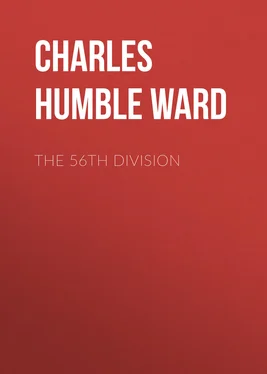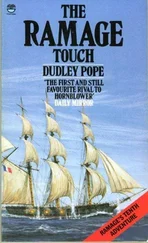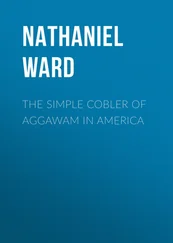Charles Humble Dudley Ward - The 56th Division
Здесь есть возможность читать онлайн «Charles Humble Dudley Ward - The 56th Division» — ознакомительный отрывок электронной книги совершенно бесплатно, а после прочтения отрывка купить полную версию. В некоторых случаях можно слушать аудио, скачать через торрент в формате fb2 и присутствует краткое содержание. Жанр: foreign_prose, История, foreign_edu, foreign_antique, на английском языке. Описание произведения, (предисловие) а так же отзывы посетителей доступны на портале библиотеки ЛибКат.
- Название:The 56th Division
- Автор:
- Жанр:
- Год:неизвестен
- ISBN:нет данных
- Рейтинг книги:5 / 5. Голосов: 1
-
Избранное:Добавить в избранное
- Отзывы:
-
Ваша оценка:
- 100
- 1
- 2
- 3
- 4
- 5
The 56th Division: краткое содержание, описание и аннотация
Предлагаем к чтению аннотацию, описание, краткое содержание или предисловие (зависит от того, что написал сам автор книги «The 56th Division»). Если вы не нашли необходимую информацию о книге — напишите в комментариях, мы постараемся отыскать её.
The 56th Division — читать онлайн ознакомительный отрывок
Ниже представлен текст книги, разбитый по страницам. Система сохранения места последней прочитанной страницы, позволяет с удобством читать онлайн бесплатно книгу «The 56th Division», без необходимости каждый раз заново искать на чём Вы остановились. Поставьте закладку, и сможете в любой момент перейти на страницу, на которой закончили чтение.
Интервал:
Закладка:
He then goes on to discuss what can be done to break the will of England. He says that the history of the English wars against the Netherlands, Spain, France, and Napoleon is being repeated. That England is “obviously staking everything on a war of exhaustion.” He puts the winter of 1917 as the latest date when a food crisis and “the social and political crisis that always follow them, among the members of our alliance,” will occur, and asks, or rather states, that England must be shown that her venture has no prospects. But “in this case, of course, as in most others involving higher strategic decisions, it is very much easier to say what has to be done than to find out how it can and must be done.”
How can one inflict a decisive defeat on England on land? Invasion is impossible—the German Navy is convinced of that.
“As far as our own Continent of Europe is concerned, we are sure of our troops, and are working with known factors. For that reason we must rule out enterprises in the East, where England can only be struck at indirectly. Victories at Salonica, the Suez Canal, or in Mesopotamia can only help us in so far as they intensify the doubts about England’s invulnerability which have already been aroused among the Mediterranean peoples and in the Mohammedan world. Defeats in the East could do us palpable harm among our allies. We can in no case expect to do anything of decisive effect on the course of the war, as the protagonists of an Alexander march to India or Egypt, or an overwhelming blow at Salonica, are always hoping. Our allies have not the necessary means at their disposal. We are not in a position to supply them, owing to the bad communications, and England, which has known how to swallow the humiliations of Antwerp and Gallipoli, will survive defeats in those distant theatres also.
When we turn from them to the European theatre, where England can be struck on land, we cannot close our eyes to the fact that we are faced with an extraordinarily difficult problem.”
It would seem that England was giving poor von Falkenhayn a lot of trouble. After looking vainly in the East for a vulnerable point in her armour, he is forced to turn his eyes to the West. And in the West he does not like the look of the British Army. He cannot collect more than twenty-five or twenty-six divisions to attack with, and they are not nearly enough!
“Attempts at a mass break-through, even with an extreme accumulation of men and material, cannot be regarded as holding out prospects of success against a well-armed enemy whose moral is sound and who is not seriously inferior in numbers. The defender has usually succeeded in closing the gaps. The salients thus made, enormously exposed to the effects of flanking fire, threaten to become a mere slaughterhouse. The technical difficulties of directing and supplying the masses bottled up in them are so great as to seem practically insurmountable.”
He sweeps aside the idea of attacking the English Army with a final complaint that, even if he drove it completely from the Continent, “England may be trusted not to give up even then,” and France would not have been very seriously damaged, so that a second operation would have to be taken against her. It would be impossible to get sufficient men.
England’s allies are called her “tools,” and the only thing to do is to smash up the “tools.” But no weapon is to be discarded, and so unrestricted submarine warfare must be undertaken against this arch-enemy.
“If the definite promises of the Naval Authorities that the unrestricted submarine war must force England to yield in the course of the year 1916 are realised, we must face the fact that the United States may take up a hostile attitude. She cannot intervene decisively in the war in time to enable her to make England fight on when that country sees the spectre of hunger and many another famine rise up before her island. There is only one shadow on this encouraging picture of the future. We have to assume that the Naval Authorities are not making a mistake.”
As for the “tools,” Italy is ruled out as a possible one to be broken as she is not of much account in Falkenhayn’s opinion, and he thinks there will soon be internal troubles. Russia is also ruled out because he does not see any gain in the capture of Petrograd or Moscow, and there are also “internal troubles.” There is France left.
“As I have already insisted, the strain on France has almost reached the breaking-point—though it is certainly borne with the most remarkable devotion. If we succeed in opening the eyes of her people to the fact that in a military sense they have nothing more to hope for, that breaking-point would be reached and England’s best sword knocked out of her hand.... Within our reach behind the French sector of the Western Front there are objectives for the retention of which the French Staff would be compelled to throw in every man they have. If they do so the forces of France will bleed to death.... The objectives of which I am speaking now are Belfort and Verdun.”
Altogether this document, which was prepared for the Kaiser and must have been read by that potentate with mixed feelings, was not the work of an optimist. It reads more like despair, as though Falkenhayn was saying, “I can still fight, I can still hurt, but I am bound to go down in the end”! One cannot see any very shrewd reasoning in it, for he not only underrated the valour of the French (as the Germans always did), but he was placed in very serious difficulties by the successful attack of Brussiloff on the Austrians in June, so that he also undervalued the strength of Russia. For this misfortune, however, the Germans blame the Austrians, condemning them for their offensive against the Italians in May, which was undertaken against German advice and made the Brussiloff adventure possible. But this document shows the policy and plans of Germany for the year 1916—the great German effort on Verdun, which was to bleed France to death, dominates all other events. The attack was launched on the 21st February and coincides with the formation of the 56th Division, and the subsequent movements of the division were connected with the wide-spreading influence of the Verdun battle.
In his dispatch dated the 29th May, Sir Douglas Haig sums up the early situation very briefly. Since the 19th December, 1915,
“the only offensive effort made by the enemy on a great scale was directed against our French Allies near Verdun. The fighting in that area has been prolonged and severe. The results have been worthy of the highest traditions of the French Army and of great service to the cause of the Allies. The efforts made by the enemy have cost him heavy losses both in men and in prestige, and he has made these sacrifices without gaining any advantage to counterbalance them.
During the struggle my troops have been in readiness to co-operate as they might be needed, but the only assistance asked for by our Allies was of an indirect nature—viz., the relief of the French troops on a portion of their defensive front. This relief I was glad to be able to afford.”
On the other hand, plans for a Franco-British offensive had been fully discussed by Sir Douglas Haig and Marshal Joffre and complete agreement arrived at. Vast preparations were in progress. Sir Douglas Haig desired to postpone the attack as long as possible, because both the British Army and the supply of ammunition were growing steadily, and time would enable the newer troops to complete their training. But though the original plans had no connection with Verdun, they were bound to influence and be influenced by the great German attack.
It may be said that the Entente Powers were not looking for a speedy termination of the war, but were bent on inflicting heavy blows on Germany and her allies, while Germany was seeking, by a concentration on France at Verdun, to gain a decision in the West. Falkenhayn’s advice was being followed, although the unrestricted submarine warfare was postponed for the time being.
Читать дальшеИнтервал:
Закладка:
Похожие книги на «The 56th Division»
Представляем Вашему вниманию похожие книги на «The 56th Division» списком для выбора. Мы отобрали схожую по названию и смыслу литературу в надежде предоставить читателям больше вариантов отыскать новые, интересные, ещё непрочитанные произведения.
Обсуждение, отзывы о книге «The 56th Division» и просто собственные мнения читателей. Оставьте ваши комментарии, напишите, что Вы думаете о произведении, его смысле или главных героях. Укажите что конкретно понравилось, а что нет, и почему Вы так считаете.




![Александр Ирвин - Tom Clancy’s The Division 2. Фальшивый рассвет [litres]](/books/417744/aleksandr-irvin-tom-clancy-s-the-division-2-falsh-thumb.webp)







